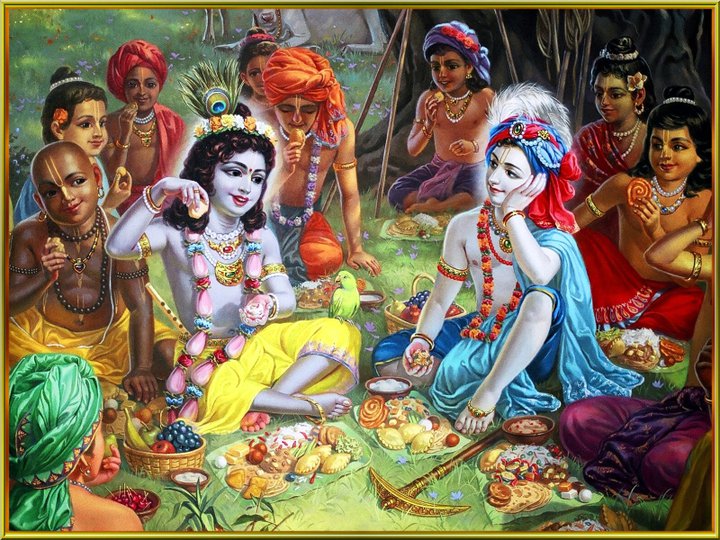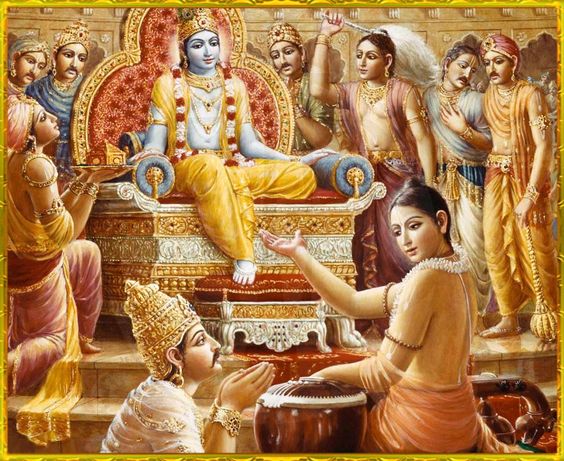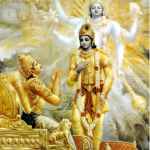Bhagavad Gita Chapter 3 Summary – Karma Yoga – Krishna, in the previous chapter, recommends buddhi-yoga, or Kṛṣṇa consciousness as the path of self-realization. Arjuna thought of this as retiring from active life and practicing penances in a secluded place. But Krishna is also insisting him to fight the battle. So Arjuna starts this chapter by putting forward this confusion to Krishna. Krishna clears his confusion by explaining Karma Yoga. We will divide this chapter into 6 sections for better understanding.
Table of Contents
Yajna (BG 3.1-9)
Krishna, in response to his confusion, speaks in BG 3.5 that nobody can remain without acting as the 3 modes always propel us to perform some activities. We are born with a specific nature and according to our nature, we must engage ourselves. Krishna further in BG 3.6 says that if one represses his senses of action but his mind is dwelling on the object of senses, then he is a pretender.
Life Time Fitness – 14540 W Mcdowell Rd Goodyear, AZ – Health & Fitness, Exercise & Fitness Programs, Health Clubs – (623)-536-9595 bodybuilding cadillac align pilates: allows you to perform more than 80 different exercises – cadillac – pilates – aerobics, fitness and pilates – fisaude storeBut how must one act? Krishna says in BG 3.9 that action must be performed as yajna or sacrifice, otherwise, our actions will bind us to this material world.
yajñārthāt karmaṇo ’nyatra
loko ’yaṁ karma-bandhanaḥ
tad-arthaṁ karma kaunteya
mukta-saṅgaḥ samācara
Translation- Work done as a sacrifice for Viṣṇu has to be performed; otherwise work causes bondage in this material world. Therefore, O son of Kuntī, perform your prescribed duties for His satisfaction, and in that way, you will always remain free from bondage.[BG 3.9]
What is sacrifice?
It is to give up a personal sense of gratification and work selflessly. Teachers teaching, mothers caring for kids, administrators protecting the citizens are some examples of sacrifice. The ultimate beneficiary of sacrifice is Vishnu, which liberates us. Karma yoga means all actions are to be done as a sacrifice.
In essence, nobody can become freed from actions. Actions are born of nature and should be performed as sacrifices, which will liberate us and make us live happy life.
Sin (BG 3.10-16)
As seen in the previous section, yajna refers to actions born out of nature which is regulated according to the scriptures. Various demigods are in charge of universal affairs and they have prescribed certain duties according to our nature. These duties are elaborately described in the 18th Chapter- actions performed by the 4 varnas.
We all know that we must eat for survival. Saintly people offer everything to Krishna and honor the remnants. Krishna says in BG 3.13 that, if we eat simply to satisfy hunger without offering it to Krishna, then we are only eating sin.

yajña-śiṣṭāśinaḥ santo
mucyante sarva-kilbiṣaiḥ
bhuñjate te tv aghaṁ pāpā
ye pacanty ātma-kāraṇāt
Translation- The devotees of the Lord are released from all kinds of sins because they eat food that is offered first for sacrifice. Others, who prepare food for personal sense enjoyment, verily eat only sin.[BG 3.13]
In essence, if we neglect vedic injunctions and perform actions, then we are simply performing sin.
Self-Situated Souls (BG 3.17-24)
BG 3.1-16 are for those who are under the 3 modes. Verse BG 3.17-24 are for the Self situated people who are beyond 3 modes. They are very very rare and Krishna says that they don’t have any duty to perform.
But if they do not perform any action and simply lie down, others will also follow and become degraded. Thus although they do not have any duty, they perform duty perfectly to set an example. Like Janaka, Bhishma.
yad yad ācarati śreṣṭhas
tat tad evetaro janaḥ
sa yat pramāṇaṁ kurute
lokas tad anuvartate
Translation- Whatever action a great man performs, common men follow. And whatever standards he sets by exemplary acts, all the world pursues.[BG 3.21]
Krishna says that He is also beyond 3 modes, but He performed His duties like getting up early, taking bath, giving charity to brahmanas, meditating hymns, engaging in kingly affairs, etc to set a perfect example.

Constructive Engagement (BG 3.25-29)
Those who are in higher strata of Krishna consciousness must know how to engage all kinds of people in different activities. A state is a state where everyone is constructively engaged.
Do not restrain people from working. If they are stopped, then they will do more sinful activities. So engage people in working according to their nature rather stopping their fruitive work
Karma Yoga (BG 3.30-35)
How to Convert actions to liberation? Verse 30 gives the answer and is the essence of this chapter defining what Karma Yoga is .
mayi sarvāṇi karmāṇi
sannyasyādhyātma-cetasā
nirāśīr nirmamo bhūtvā
yudhyasva vigata-jvaraḥ
Translation- Therefore, O Arjuna, surrendering all your works unto Me, with full knowledge of Me, without desires for profit, with no claims to proprietorship, and free from lethargy, fight.[BG 3.30]
In essence, we have a nature and that nature must be engaged in service to Krishna.
Lust (BG 3.36-43)
Arjuna asks Krishna in Verse 36, what impels us to perform sin.
Krishna says that it is lust alone that is responsible. Lust is sitting everywhere, in the senses, mind, intelligence and our identity.
śrī-bhagavān uvāca
kāma eṣa krodha eṣa
rajo-guṇa-samudbhavaḥ
mahāśano mahā-pāpmā
viddhy enam iha vairiṇam
Translation- The Supreme Personality of Godhead said: It is lust only, Arjuna, which is born of contact with the material mode of passion and later transformed into wrath, and which is the all-devouring sinful enemy of this world.[BG 3.37]

Krishna also gives 3 analogies for describing different degrees of lust covering the soul-
- Mirror covered by dust (very easy to overcome)
- Fire covered by smoke (very difficult)
- Embryo covered by womb (very very difficult)
Conclusion
The conclusion is given in the last verse- BG 3.43
evaṁ buddheḥ paraṁ buddhvā
saṁstabhyātmānam ātmanā
jahi śatruṁ mahā-bāho
kāma-rūpaṁ durāsadam
Translation – Thus knowing oneself to be transcendental to the material senses, mind, and intelligence, O mighty-armed Arjuna, one should steady the mind by deliberate spiritual intelligence [Kṛṣṇa consciousness] and thus – by spiritual strength – conquer this insatiable enemy known as lust.[BG 3.43]
The mind is superior to the senses and intelligence is superior to the mind. Thus, first of all, intelligence must be spiritualized by associating with Bhagavad Gita. Then by controlling the mind through spiritual intelligence, one can easily conquer lust and heart will be filled with kindness, empathy, feeling for other’s sufferings, and desire to engage in the service of Krishna




